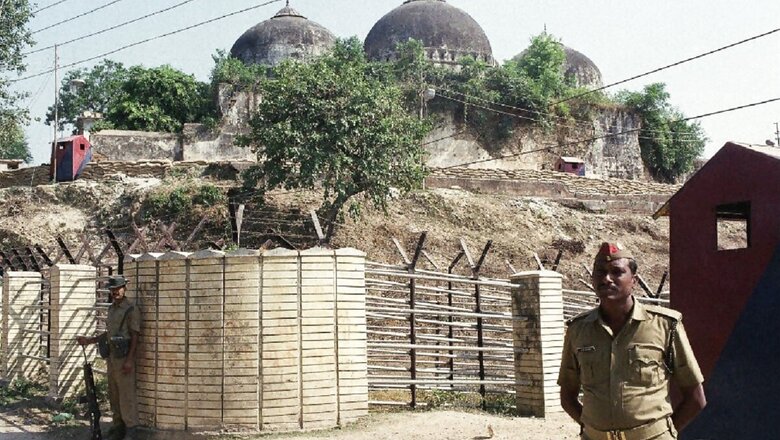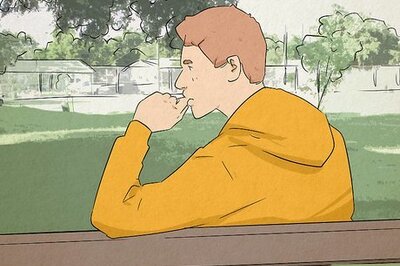
views
On August 5, while all attention will be on Ayodhya with the first bricks for the construction of the Ram temple to be laid, 130 km away in Lucknow, a special CBI court will continue hearing the Babri Masjid demolition case. Some of the leading players of the temple movement may be present in Ayodhya on the day but, as accused in the demolition case, their fate will soon be decided by the court.
Last year, on November 9, a Supreme Court bench headed by the-then Chief Justice of India, Ranjan Gogoi, had brought to an end the long-standing title suit over the Ram Janmabhoomi-Babri Masjid dispute. In a unanimous verdict, the bench ruled in favour of the Hindu litigants and ordered that the disputed 2.77 acre of land be handed over to a trust to be set up by the Centre for construction of a temple.
With one case reaching finality in the apex court, focus has shifted to the other case. The case of demolition, which began after December 6, 1992. The Supreme Court in its title suit judgement had also observed that the demolition of the mosque was a criminal act.
28 YEARS OF DEMOLITION CASE—THE HISTORY
After 28 years of often-derailed investigations and trial, the matter has finally reached the concluding stages of hearing in the special CBI court in Lucknow. Out of the 32 surviving accused, 31 have recorded their final statements under section 313 of the CrPC. One of the lesser known accused is absconding. 351 witnesses have been examined so far. And to no one’s surprise, all the accused have claimed innocence and alleged that they have been framed in the case.
Here’s a brief history of the case which has seen many ups and downs. A case which after almost three decades still lingers on. A case in which many of the 49 accused are already dead and those still active include some high-profile names of Indian politics: among them a former deputy prime minister, former chief minister, some former cabinet ministers, and a few sitting Members of Parliament .
DEMOLITION AND THREE DIFFERENT TYPES OF FIRs
Just minutes after demolition of the Babri mosque on December 6, 1992, the first FIR no. 197/92 was registered against unknown “kar sevaks” at 5.15pm under sections 395, 397, 332, 337, 338, 295, 297, 153A of IPC, and section 7 of the Criminal Law Amendment Act.
Ten minutes later, a second FIR (no. 198/92) was registered under sections 153A, 153B, 505 of IPC against LK Advani, Ashok Singhal, Giriraj Kishore, Murli Manohar Joshi, Uma Bharti, Vinay Katiyar, Vishnu Hari Dalmiya and Sadhvi Ritambhara. This was the hate-and-provocative-speech case.
Forty-seven other FIRs were also registered in the days to come related to offences of assault on media persons, looting valuables like cameras and reporting gadgets from them, etc. All FIRs were filed at Thana Ramjanmabhoomi in Ayodhya.
CASES TO CBI
In days following the FIRs, a curious move was made by the-then government. While case no. 197 was recommended for CBI probe, case no. 198 against accused politicians was handed to the CB-CID wing of the Uttar Pradesh police. On August 27, 1993, the UP state government transferred all the remaining 48 cases including case no. 198 for CBI probe.
CBI took up the investigation in all the cases related to Babri Masjid demolition and filed a consolidated single charge sheet against 40 people in all the 49 cases in a special court of Lucknow on October 5, 1993.
More than two years later, on January 11, 1996, the agency filed a supplementary charge sheet against nine other prominent people. The total tally of accused reached 49.
CHARGE OF CRIMINAL CONSPIRACY SLAPPED
Contrary to initial FIRs in the case, the CBI in its charge sheet came up with the argument of having concrete and strong evidence to prove that demolition of the mosque was the fallout of a larger and sinister conspiracy. It also came up with new names as accused, which included top guns of the BJP and RSS, the stalwarts of the Ram temple movement. A charge under section 120(b) of criminal conspiracy was added against the accused.
LEGAL BATTLE AND DERAILMENTS THEREAFTER
With the charge sheet being filed against the bigwigs of BJP and RSS, the stage was set for the commencement of trial in the case. However, the matter got entangled in legal complexities.
September 9, 1997
The special judge after hearing the petitioner and the defense counsel, passed an order holding a prima facie case for framing of charges against the accused under section 120(B), that is criminal conspiracy, under IPC and other relevant sections of law. The court ordered that formal charges would be framed in the next hearing.
Some of the accused move the Lucknow bench of the Allahabad high court against the lower court’s decision to frame charges. The matter kept lingering through legal manoeuvrings.
February 12, 2001
Justice Jagdish Bhalla of the Lucknow bench of the Allahabad high court passed a detailed order. He found no illegality in a joint single charge sheet for all the FIRs, since the offences were allegedly committed in the same course of action for accomplishing a conspiracy.
However, taking note of an administrative lapse on part of the UP government, relating to notification of the trial court for crime no 198/92, that is hate speech case against Advani and others, the high court while upholding framing of charges in all other 48 cases, denied the same in case no. 198 against Advani, Joshi, Uma Bharti, Vinay Katiyar and others.
The high court, however, said that the state government’s faulty notification for fixing the trial court dated October 8, 1993 was curable and could be done so through another notification.
May 4, 2001
Against the backdrop of the HC order, the Lucknow court dropped the proceedings against not just the original eight accused, but also against 13 others.
June 16, 2001
The CBI wrote to the UP government, asking it to rectify the error pointed out by the high court and issue a fresh notification empowering the special court for resuming trial. The UP government then headed by chief minister Rajnath Singh decided not to issue any fresh notification.
TRIAL IN DIFFERENT COURTS: LUCKNOW-RAEBARELI
January 27, 2003
Following legal deliberations, the CBI moved a petition in the designated court of Raebareli, requesting the court to proceed with the trial of the case 198/92 related to hate speeches against Advani and others.
September 19, 2003
In a major development, special magistrate, Raebareli, discharged Advani in case no. 198/92 but ordered framing of charges against the remaining accused. Advani was then the deputy prime minister of India.
July 2005
On July 6, 2005, the high court after hearing several review petitions filed against the Raebareli court’s order of acquitting Advani, ordered re-framing of charges against him and all the other accused. Subsequently on July 26, the Raebareli court framed charges against all the accused.
As the matter kept languishing in two different courts, a debate raged about the necessity for it and whether the two separate trials could do justice to the matter in which the sequence of the crimes was related. The earlier order of the Lucknow trial court dropping proceedings against 13 other accused and further striking down the charge of criminal conspiracy against the most important of the accused, also remained a cause of legal concern.
March 20, 2012
After a series of derailments and legal hurdles from the trial courts and high court, the CBI finally reached the Supreme Court in 2011 and subsequently filed an affidavit on March 20, 2012, during the UPA 2 government headed by Prime Minister Manmohan Singh. The CBI made a strong argument for a common trial of all the 49 cases. It argued:
1) Investigations in all 49 cases had disclosed that there was a single general conspiracy by all the 49 accused, to demolish the disputed structure.
2) Each of the accused facilitated and participated in the fulfilment of the criminal conspiracy.
3) All the 21 persons against whom the proceedings were dropped were party to criminal conspiracy.
4) The 13 accused who were not being tried for any offences in any court of law were party to the conspiracy and demolition.
5) Hence, it was in the interest of justice that all the accused involved in criminal conspiracy and demolition of the disputed structure were tried in the court of the special judge at Lucknow.
Supreme Court — April 19, 2017
After remaining pending for almost five years in the Supreme Court, a major moment in the case came on April 19, 2017. The top court ruled against the Allahabad HC order of dropping conspiracy charges. The SC ordered invoking of conspiracy charges against the accused including LK Advani and 20 others. The trial of all cases was also brought back to the Lucknow court.
PRESENT STATUS: DAY-TO-DAY HEARING IN LUCKNOW COURT
From 2017 onwards there had been speedy hearing in the case as the charges were framed and trial on the joint charge sheet began. In between, with Kalyan Singh becoming the governor of Rajasthan, trial against him was stopped since he occupied a constitutional office.
However, last year, after he demitted the office of the governor, the trial against him also began. Last month most of the big names in the case including Advani, MM Joshi, Kalyan Singh, Uma Bharti, Vinay Katiyar and Champat Rai (general secretary of the Ram Janmabhoomi Teerth Kshetra Trust) have recorded their final statements under section 313 of CrPC.
So how long before the trial in the case is completed? Advocate Abhishek Ranjan, who is also the counsel for Advani, Joshi and Kalyan Singh, says “The proceedings are in the final stages. After the 313 CrPC statement, the defence will once again like to question the needed witnesses. The Supreme Court has fixed August 31 as the final date for conclusion of the hearing. Hence day-to-day hearing is going on.”
SEVERAL ACCUSED AND WITNESSES ALREADY DEAD
Over the course of 28 years, several accused have already died: Bal Thackeray, Ashok Singhal, Giriraj Kishore, and others.
Senior advocate IB Singh, who had argued in defence of several of the accused, said, “The trial is in its last leg now. We expect a judgement in the case soon.”
On the question that 28 years on, a judgement is still awaited from a CBI court, Singh said, “The case has been of big drawbacks from the first day, right from why different FIRs were registered for a crime related to the same incident... over the years it has been more an effort of political witch hunt rather than serious investigation of the crime.”
But now, many hope the year of Bhoomi Poojan for the Ram temple will also bring judgment in the criminal act of demolishing a religious place: the Babri mosque.


















Comments
0 comment